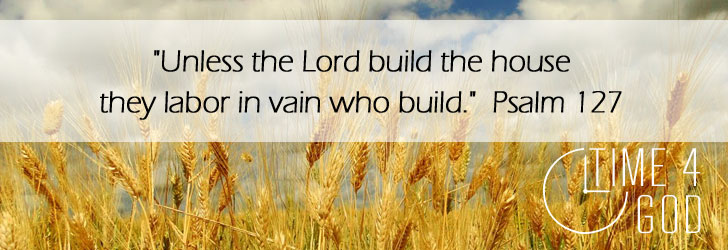Labor Not in Vain
This is a message that the post-modern, often cynical world, refuses to accept. The post-modern age is full of self-assertions, self-importance, and arrogance.

They labor in vain who build.
Unless the Lord guard the city,
In vain does the guard keep watch.ʺ
This is a message that the post-modern, often cynical world, refuses to accept. The post-modern age is full of self-assertions, self-importance, and arrogance. This post-modern age claims it has left ʺprimitiveʺ ideas of God, or gods behind, and to have assumed the mantel of authority for everything to itself. The typical post-modernist believes that science and human reason are the sources of all knowledge, and he or she ʺtrustsʺ his or her theories with a tenacity that looks suspiciously like faith. But to trust in a theory is vain, indeed. Theories last only as long as they are not replaced by newer theories, which, of course, is always the case. And theories can only be as good or as permanent as the finite human minds that perceive them. There is no room for mystery in the post-modern world view. In that world, if it can not be proven by scientific evidence or mathematical formula, it does not exist. Take, for example, the theory of evolution. There is evidence for evolution in the scientific record, of course, but the problem is that, no matter how hard they try, they cannot offer any reasonable explanations for evolution’s origins without bumping into a mystery. But, because they cannot tolerate mystery, their answers about evolution’s origins always sound more like a matter of ʺfaithʺ than reason.
Do not get me wrong. I know these post-modern philosophies are not completely wrong. Science has given us a deeper understanding of the workings of the material world. And many who hold these theories express a love for creation that is worthy of a human being. They are just missing one key fact. Creation comes from Something, from the very Ground of Being, Being Itself, God. A theory is a bloodless thing. It has reason in it, of course, but (to paraphrase Scripture) ‘we do not live by reason alone,’ at least not healthily. It seems to me that the biggest danger in post-modernism is the human claim to absolute authority. To claim absolute authority to oneself in all things is, as history shows us, a prescription for tyranny. And what tyrant does not claim that he or she is the ultimate source of all wisdom, of all knowledge, of all power? What tyrant does not also claim that what he or she does is out of love? And is not that ʺloveʺ most often a ʺtheoryʺ of some kind, rather than a generous, unconditional love for real people, in general, or individual human beings in particular?
[content-ad]
Because we believe in a Creator who created all that is seen and unseen out of love, and because we have seen that love in human form, in Jesus Christ, we live in humble awe of his creation. Creation is not just a theory to a Christian, but a loving action that we are all a part of, and for which we must take responsibility in everything that we do. We respect God’s creation, and are in awe of it, because we have a personal relationship with the loving Being who created all of it, who enlivens it, and all of us, in every moment, and who reveals himself in and through that creation at every level. Because we know this, we know too, that we must live in it, with it, and for it, justly. We know that we can claim no powers beyond our condition. Because we know God created it, redeemed it, and loves it beyond any love that we can experience in our finiteness, we know that we ought to humbly and willingly bend our wills to his creative will. Well, that is what we ought to do. But we fail at it, more than we are willing to admit sometimes, do we not? Maybe that is why we can be criticized so readily by those who do not believe.
We believe that, ʺOne does not live by bread (theory) alone, but by every word that comes from the mouth of God.ʺ (Matthew 4:4) We believe that it is God that breathes life, and goodness, and beauty into everything in creation, that he sustains it all times with his ʺYes!ʺ Because we know we are loved beyond our ability to speak of it, we are moved to love all of God’s creation in turn. But, we fail at this more often than we want to as well. Still, we know and believe that, because of the life, death, and resurrection of Jesus Christ, we can be forgiven. We know that with forgiveness comes the grace that fills us with an ever-deepening desire to learn from our mistakes and to try to improve. Because we believe in God, we believe in reason, and in transcendent things like, beauty, goodness, truth, and love. Because we believe in Love, we are filled with faith and hope. We are not frustrated by mystery. We accept the reality that God is the ʺbuilder.ʺ Because we believe this, our labors are not in vain. We love because we have been loved. This is no mere theory. It is a fact; a historical fact. Thanks be to our loving God. Amen.
SKM: below-content placeholderWhizzco for FHB

